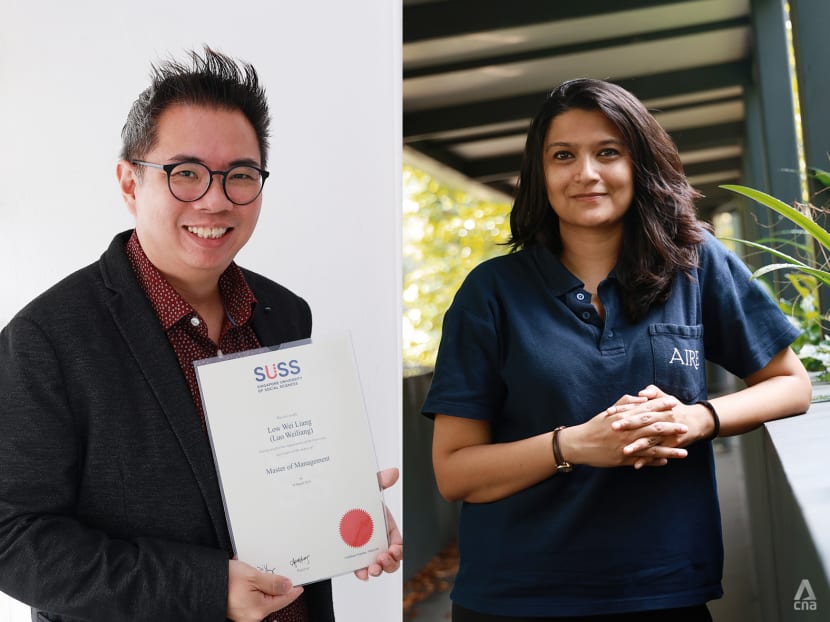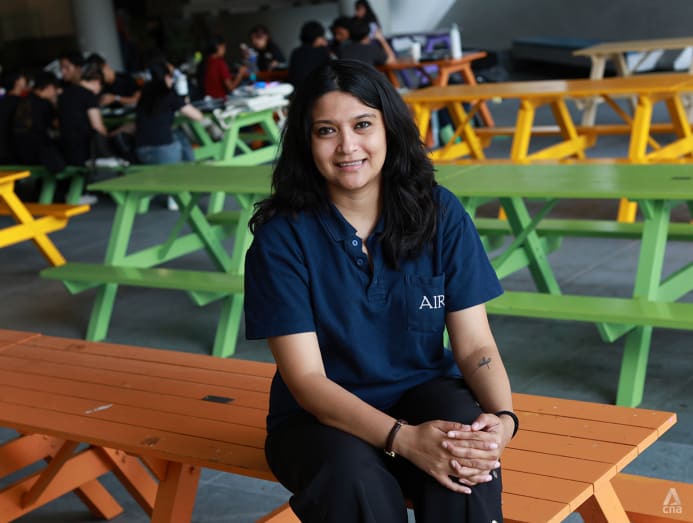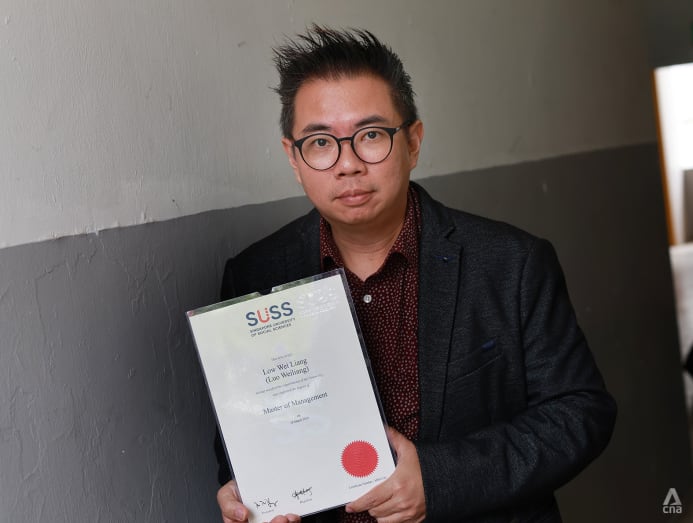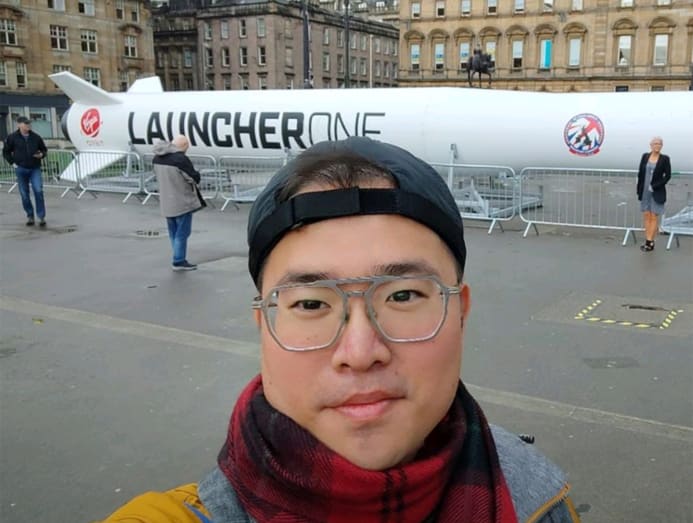'Drained all my savings': Some master's degree graduates wonder if sacrifice pays off
From six-figure costs to uncertain job prospects, some Singapore professionals question whether their master's degree will pay off career-wise. Experts said that it depends on the intention of doing the extra study, the industry in question and what one hopes to gain.

Mr William Low (left), 46, has a master's degree in management and Ms Nivedita Venkateish (right), 35, has a master's degree in business administration. (Photo: CNA/Raj Nadarajan)

This audio is generated by an AI tool.
A master's degree has long been seen as a significant qualification to help employees open doors to better job opportunities, higher pay or even a career change.
However, the reality can be less straightforward, given Singapore's sluggish job market of recent years, with some recent master's degree graduates reporting that they have not necessarily achieved the employment edge that they were hoping to get.
The return on investment on the cost of such a degree, as well as the opportunity cost of taking time out to complete it, were the other concerns raised.
For telecommunications engineer Noel Png, 31, the decision to pursue a master's in mechanical engineering at the University of Strathclyde in the United Kingdom was motivated by the need to reset his career.
He had graduated with a weak grade point average (GPA) from his undergraduate engineering course at the National University of Singapore and found himself on the back foot in the domestic job market.
"I felt that if I was going to compete with a disadvantage, I needed to find a way to level the playing field. That’s when I started seriously considering a master’s degree overseas – something that could add value to my resume," he told CNA TODAY.
He left a full-time job to pursue the master's degree from the UK at the start of 2020, but this was not a simple decision. Mr Png said that many people around him advised caution, especially since COVID-19 was a looming global crisis.
"People were telling me, 'Don’t leave your job, it’s too risky'. But I felt like I'd been playing it too safe. Something had to change."
After completing his two years of studies and returning home, he began to realise that the master's degree from an overseas university might not guarantee smooth re-entry into the job market here, Mr Png said.
"When I came back, I thought there would be more receptiveness to an overseas master's, but it's really industry-dependent," he added.
“Many people in HR (human resource) didn't understand my degree. Singapore tends to value brand-name universities more. They don't really know how to peg the standards of lesser-known schools."
The financial cost of the degree, which came up to around S$18,000 after securing a partial scholarship, also weighed on Mr Png.
"Every Singaporean gets to that stage where you're settling down, planning for a flat and here I was, with two years of studying full-time and not working, losing out on two years of salaries."
Asked if he ever had a moment when he regretted pursuing his master’s, Mr Png said: "Yes, definitely. This is purely from a financial perspective. I probably could've done an online version of it and maybe just dropped to a four-day workweek instead."
Ms Nivedita Venkateish, 35, also made sacrifices to secure a master's degree.
She turned down a promotion at the alcoholic beverage company where she was working and an opportunity to work in Dubai in 2016 to pursue her dream of earning a master's degree at an Ivy League business school in the United States.
“One of my biggest motivations was to live abroad, specifically in the US. I was very clear that I would only go for my master's if it were an Ivy League institution," she said.
"It was a significant investment. Not just the lump-sum cost, but also the opportunity cost," she added, referring to the promotion she turned down.

Ms Venkateish spent more than US$150,000 (S$192,000) to pursue a Master of Business Administration (MBA) at Columbia Business School, an Ivy League business school in New York.
Things went well for her after graduation in 2019. She secured a job offer at the Kraft Heinz Company, an American multinational food firm, as well as an H-1B visa – a non-immigrant visa that allows US companies to employ foreign workers temporarily, awarded through a lottery system.
She accepted the job offer and worked there for almost two years.
Eventually, she chose to return to Singapore in 2021 because she valued being close to her family and the unique qualities of life that the city offers.
Looking back, she admitted that from a purely financial perspective, pursuing her master’s abroad "probably wasn’t worth it".
A regional programme such as one from INSEAD – a prestigious French business school with a campus in Singapore – might have made more sense, she added.
"I came back having drained all my savings and I decided to work on a startup in Singapore. Essentially, I was back to being poor."
Another master's degree graduate with some doubts about whether the extra study paid off in career terms is Mr William Low, 46.
Mr Low, a former polytechnic lecturer who taught modules related to events and the MICE (meetings, incentives, conventions and exhibitions) industries, decided to return to school after taking a career break to care for his dying father.
He completed a master's degree in management at the Singapore University of Social Sciences in December last year, but has concluded that it did not give him a significant edge in the job market.
“I always listed the master's in my job applications, stating clearly that I had graduated. But these days, it's quite common to see candidates with postgraduate qualifications, so it may not always stand out," he said.
After graduation, he spent several months considering his next steps and discussing a full-time role with a startup's founder. He eventually took on the job, though it came with a significant pay cut.

Despite these mixed experiences, enrolment in master's and other post-graduate programmes in Singapore continues to grow.
Figures from the Department of Statistics showed that the number of graduates from higher degree programmes – including master’s and PhDs – more than doubled over the past decade or so, rising from 6,794 in 2010 to 13,708 in 2023, reflecting a growing interest in post-graduate studies.
However, in today's job environment, where experience often outweighs academic qualifications and employers are increasingly selective, the question remains: Is a master's degree truly worth the investment?
This dilemma is not unique to Singapore. Last November, The Economist reported that new research shows a surprisingly high proportion of master’s students in the US see little to no financial return from their degrees – with nearly 40 per cent ending up no better off, or worse off, financially.
While master's degrees in fields such as computer science, engineering and MBAs from elite schools tend to pay off, many others – often in fields commonly associated with the humanities – are costly detours.
Researchers said that some of the contributing factors included student insecurity, weak job markets and universities capitalising on demand to justify high tuition fees.
A MUST-HAVE OR GOOD-TO-HAVE?
Career and human resource experts who spoke to CNA TODAY cautioned that a master's degree is not a silver bullet for navigating today’s challenging job market.
The reality is that employers are increasingly prioritising practical skills, relevant experience and adaptability over academic qualifications alone, they said.
Ms Sumita Tandon, head of HR for Asia Pacific at professional networking platform LinkedIn, said the site has been seeing employers shift towards a skills-first hiring approach, with more than 45 per cent of hirers on LinkedIn explicitly using skills data to fill their roles.
Likewise, Mr Shannon Peter Pang, global job website Indeed's sales team lead for Asia, said the firm's data showed that 70 per cent of Singapore employers are more willing to hire someone with relevant job experience and no degree, over a candidate with a degree but no hands-on experience.
"We’re seeing a more nuanced hiring landscape in Singapore. While some sectors, such as consulting, finance and technology, continue to value postgraduate qualifications, employers across the board are prioritising practical, demonstrable skills and experience," Mr Pang said.
Mr David Blasco, country director at recruiter Randstad Singapore, echoed these sentiments, saying that a candidate holding a master's degree is one of several ways to stand out for certain highly technical job roles such as in scientific research, but it is far from a prerequisite for success in the Singapore workforce.
"From a decade to 15 years ago, master's degrees were widely viewed as a competitive edge, with educational qualifications seen as an express ticket to higher salaries and better job opportunities with top employers," he said.
“Today, master's degrees are perceived as more of a valuable benefit when pursuing roles in specialised fields such as science or medicine, rather than an essential requirement."
Mr Blasco added that employers and governments are now encouraging upskilling through job-relevant courses rather than traditional academic pathways.
"The focus has moved away from accumulating credentials to demonstrating real-world problem-solving and hands-on expertise."

The Ministry of Manpower (MOM) stated that as of 2024, more than 43 per cent of the Singapore workforce holds an academic degree – bachelor's or higher – representing an 11 per cent rise over the past decade.
Referring to the same survey by the ministry, Mr Blasco said: "However, MOM also noted that nearly 80 per cent of job vacancies in 2024 do not list academic qualifications as the main hiring consideration, showing a shift towards skills and experience over formal degrees for many roles."
He also said that a master's degree matters more in specialised fields such as biomedical research, clinical psychology or advanced engineering, where deep technical expertise and advanced analytical skills are essential.
On the other hand, in industries that prioritise hands-on experience – such as sales, creative roles or operations – a master's degree may be seen as unnecessary. Employers in these sectors often worry that candidates with advanced degrees might expect higher pay or become bored, raising concerns about retention and cultural fit, Mr Blasco noted.
"In areas such as accounting, law or project management, professional qualifications are often even more valuable than master’s degrees.
“Candidates with relevant certificates are also seen as more 'job-ready', as they can contribute from day one without extensive retraining and onboarding."
Does this mean that the assumption that having a master's typically leads to a higher salary or faster promotion is now outdated? Not quite, the experts said.
"It’s not outdated, but it's not guaranteed either. Employers may offer a higher starting point for roles that require niche expertise or leadership acumen, but they're also increasingly relying on performance-based progression," Mr Pang from Indeed said.
"A degree opens doors, but it's what you do once you're (hired) that drives long-term outcomes."
Mr Pang also noted that as of last year, 17 per cent of job listings on Indeed specifically mention an MBA as a requirement or a good-to-have, suggesting there is still targeted demand in some areas.
Still, intention is key when considering a master's degree. LinkedIn's Ms Tandon said the most important thing is to understand the reason behind pursuing a master's degree.
"If it aligns with where you want to grow and you see it as the right step for you, then it is absolutely worth doing. But if you’re doing it just out of fear of being left behind, it is worth pausing to reflect."
Another point made by Mr Blasco from Randstad Singapore was that professionals would do well to weigh the opportunity costs, noting that further education often means high expenses and time away from work at the cost of gaining real-world experience.
"Instead of expecting the pay bump to be guaranteed upon completing the master's programme, individuals should assess their professional goals before enrolling in one," he said.
"While advanced qualifications may create more opportunities, they do not guarantee appointment into leadership positions or substantial salary increases without the needed experience and proven track record that employers value."
THE LOVE OF LEARNING OVER SALARY GAINS
That said, some people still felt that they gained significant intangible benefits from their master's – deepening their knowledge, broadening their perspectives and networks and opening doors to opportunities they might not have otherwise pursued.
Ms Venkateish, the startup founder, said studying for her MBA in the US pushed her out of her comfort zone more than anything else and gave her the confidence to build her startup Aire, an adult diaper brand after returning to Singapore.
Mr Png, who returned to school as a form of reset, said the experience was not a "total waste".
"It's a 50-50 thing. The biggest edge I got was access to industry networks and the chance to sharpen my critical thinking skills," he added.
Beyond the classroom, it also provided him with the opportunity to take part in European space-tech competitions, strengthening his portfolio.

For Mr Low, the former polytechnic lecturer, earning a master's degree was a personal milestone.
"My late dad was a teacher. After the O-Levels, I went to ITE (Institute of Technical Education). Back then, being associated with ITE felt like the end – and for a parent who was an MOE teacher, it was a bit of a disappointment," he said.
Mr Low later went on to complete his polytechnic diploma and bachelor's degree. "Sadly, my dad didn't live to see me pursue my master's. He passed away in April 2023 from liver cancer. I dedicate this achievement to him."
In CNA TODAY's conversations with other master's degree holders, many said that they still believe in the value of the qualification, especially for those who want to stay up-to-date with changes in technology and how industries are evolving.
Mr Wong Jian Hui, 39, a planning manager with public transport operator Tower Transit Singapore, believes that with artificial intelligence, automation and sustainability reshaping businesses, a master's degree can provide the cross-industry knowledge needed to see the bigger picture and stay adaptable.
"It’s most useful for those who are curious, open to learning beyond their current scope and looking to stay relevant in a fast-evolving work environment," he said.
He graduated with a master's in information technology in 2023, driven by a mix of curiosity and a desire to future-proof his career.
As for Ms Janice Tay, 45, she left her finance role and started an early intervention centre in 2017. This was after her son was diagnosed with global developmental delay – a condition where a child shows slower progress in multiple areas of development – and other learning needs.
She said she had initially tried to obtain certificates and shorter courses, but they felt too piecemeal. Seeking a programme that connected child development, teaching strategies and inclusive practices, she enrolled in a master's degree course in special education in 2020.
“Without the master's, I might still have been able to start a centre, but I doubt I would have earned the same level of trust from professionals, government partners or even families as quickly,” she added.
"The master's wasn't a direct path to a higher salary in the traditional sense, since I transitioned from the corporate sector to founding a social enterprise. But it enabled me to build a sustainable business model that now supports a full-time team and allows us to reinvest in services, and it continues to grow."
Then there is Mr Zhuang Changzhong, 34, a former litigator whose 2023 master's in information technology armed him with the technical skills to leap from the courtroom to a financial-sector role overseeing data privacy and regulatory compliance.
"Being a litigation lawyer, it would have been difficult to go in-house into a corporate role," he said.
"But the master's programme equipped me with the skills that allowed me to find my place in regulatory legal work. I would say it had a measurable impact, where I am able to contribute meaningfully even in a new role in a new industry."
Mr Imran Khan, 39, a communications educator, completed his second master's degree – in creative writing – in 2021. His first, an MBA, enabled him to relocate from Dubai to Singapore in 2015.
That MBA, which cost him about US$60,000, delivered a clear return on investment.
"I don’t think moving to Singapore would have been possible without it," he said. It opened doors to a new market, industry and roles, and he more than recouped the cost.
After years of working in Singapore, he pursued the creative writing degree purely out of passion for the craft and the chance to connect with like-minded people.
“I went in knowing it wouldn’t necessarily pay off financially. But I wanted to be intellectually stimulated, immerse myself in the local writing scene and meet people I wouldn't have otherwise connected with," he added.
Although the monetary returns are "debatable", that was not the reason he pursued creative writing, he said.
"I had the opportunity, I could afford it and I finally had the time. So I thought, why not? Let's fulfil this childhood dream I've always had. And I'm much happier for it."
Editor's note: An earlier version of this article stated that Mr Imran Khan spent US$16,000 on his MBA. This is incorrect. His MBA cost US$60,000. We are sorry for the error.











